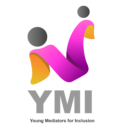AIMS AND OBJECTIVES
GENERAL OBJECTIVES
The main aim of the YMI project is the social inclusion of people with autism with a focus on generating non-discriminative and active citizenship across communities in Europe by promoting critical thinking. This project will work to create innovative approaches for the inclusion of people with autism. It is also an opportunity to develop intense collaborative synergy with partner organizations and a group of public entities, lucrative and solidary in different sectors of society.
The four main objectives of the project include:
1. Design and test a pilot innovative methodology in order to include children/youngsters on the Autism Spectrum in regular community structures on an equal basis with other children/youngsters through technical follow-up with evaluation and the necessary adaptations;
2. Empower and train “young mediators for inclusion” (facilitating agents that promote the inclusion in articulation with the family and contexts);
3. Empower and train technicians and other staff of all community partners, in order to ensure the effective participation of children/youngsters on the Autism Spectrum;
4. Design an European Guide for the inclusion of children/youngsters on the Autism Spectrum.
HORIZONAL PRIORITIES
YMI will develop and integrate innovative approaches to aid in the social inclusion of people with autism by testing the theoretical methodology based on modern paradigms of inclusion. These approaches will be developed while keeping in mind the projects’ goal of creating equal opportunities for children and young people with autism which allow them to fully participate in community structures.
The project also aims to generate social awareness around the inclusion of people with autism throughout Europe. The model of the “mediator for inclusion”, and the “European Guide for the inclusion of people with autism” will advertise the good practices tested for this project. The European guide will also be used as a tool for social development, civil, cultural and critical though, fighting this way discrimination and segregation, according to the horizontal priorities of Erasmus+.
VOCATIONAL EDUCATION AND TRAINING (VET)
Concerning the specific field in vocational education and training, priority will be given to:
1. The creation of a holistic guide to act as an international reference of inclusion specifically through curricula focusing on the implementation of “mediator of inclusion” courses for young university students as well as technicians and staff of the community partner entities.
2. The development of sustainable partnerships to establish competences at national, regional and sectorial levels. Partner associations will be able to continue to develop both courses in their native countries and to use the knowledge and experience of the “mediators for inclusion” in a social intervention context. The edition of the “European Guide for inclusion of people with autism” will provide other European associations with the opportunity to replicate the same model in their communities.



